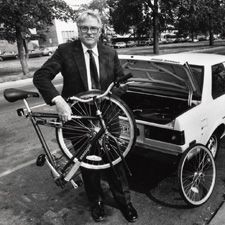BROOKLINE, MA (BRAIN)—Harry Montague, a residential architect, came up with his folding bike design to make it easier to access the Potomac River Trail, the C&O Canal and many other of his favorite rides. He hated the hassle of loading his bike onto a rack, and at 6 feet 2 inches tall and weighing 220 pounds, small wheeled folding bikes didn’t offer him the quality ride he wanted.
Montague went on to create full-size folding bike designs and founded Montague Bikes with his son, David, in 1987.
Harry Montague passed away Feb. 2 at his home in Brookline, Massachusetts, ending his battle with lymphoma. He was 77 years old.
“I’m really going to miss having him around. Until just recently he was still coming into work every day,” said David Montague. “The way we developed a design together really pushed us. Not having that relationship now is going to be hard.”
The Octagon quick-release adjustable stem, released in January, was the latest design to hit the market from the father-and-son team.
Montague received a patent for his original design, which put the rear triangle inside the front, in 1984 and began mailing the major bike companies at the time about putting his design into production, but none were interested. Alpine Cycles, the in-house brand of Georgetown Cycle Sports in Washington, D.C., made his first production run.
Montague then turned to Mark Nobilette, a budding frame builder just setting up shop in Ann Arbor, Michigan, in the mid 1980s for his second production run.
“I really admired Harry. He just wouldn’t give up on his folding idea,” said Nobilette. “And his work came at a perfect time for me. I was just starting out and could use the work and experience of helping with the project.”
The pair worked developing small wheel folding bikes, bikes with folding cranks and forks, and frames that folded multiple times. But it was the success of the folding mountain bike that really caught the market’s attention.
Montague is survived by his wife, Ruth Heald Montague, his two children, Ellen and David, and grandchildren.
In lieu of flowers the family asks that contributions in his memory be made to the MGH Cancer Center for Lymphoma Research at the Massachusetts General Hospital Development Office: 165 Cambridge Street, Boston, Massachusetts, 02114.
—Matt Wiebe
mwiebe@bicycleretailer.com


